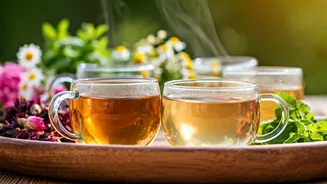Introduction to Teas
Herbal teas have long been celebrated for their health-boosting properties, especially in Ayurvedic practices. Ayurveda emphasizes the importance of balancing
the body's doshas—Vata, Pitta, and Kapha—through diet and lifestyle. Certain herbs, when consumed as teas, can help restore this balance, leading to visible improvements in skin and hair health. These teas are not just beverages; they're potent concoctions that nurture the body from within. Incorporating these teas into your daily routine offers a natural approach to beauty and wellness. They support the body's natural processes, fostering a healthy glow and encouraging hair growth. Unlike many commercial products, herbal teas offer a gentle yet effective way to achieve your beauty goals.
Rose Tea's Benefits
Rose tea, known for its delicate fragrance and soothing properties, is a powerhouse for skin health. Rich in antioxidants and vitamins, rose tea can help combat free radicals, protecting the skin from damage and premature aging. The antioxidants contribute to a radiant complexion by neutralizing harmful molecules. Regularly drinking rose tea can reduce inflammation, which can alleviate conditions like acne and eczema. Furthermore, rose tea is a natural hydrator, improving skin elasticity and overall hydration levels. The calming effects of rose tea also contribute to stress reduction, which indirectly benefits the skin, as stress can often worsen skin conditions. By incorporating rose tea into your skincare regimen, you can nurture a vibrant, healthy glow.
Hibiscus Tea's Magic
Hibiscus tea, with its tart and refreshing flavor, is packed with nutrients that benefit both skin and hair. The high vitamin C content in hibiscus tea supports collagen production, vital for maintaining skin elasticity and reducing wrinkles. Its antioxidant properties help to shield the skin from environmental stressors. Hibiscus also has natural exfoliating properties, aiding in removing dead skin cells and revealing a brighter, smoother complexion. For hair, hibiscus can strengthen the hair follicles, reduce hair fall, and promote hair growth. The consumption of hibiscus tea can also improve blood circulation in the scalp, further supporting hair health. This tea offers a holistic approach to beauty, addressing both skin and hair concerns effectively and naturally.
Nettle Tea's Power
Nettle tea is an often-overlooked yet powerful ally in the pursuit of healthy skin and hair. It's loaded with minerals such as iron, silica, and sulfur, which are essential for hair growth and strength. The presence of these minerals makes nettle tea highly beneficial for stimulating hair follicles and reducing hair fall. Nettle tea can also help in managing conditions like eczema and psoriasis due to its anti-inflammatory properties, providing relief from itchiness and redness. It works by purifying the blood, thus leading to clearer, healthier skin. Regularly drinking nettle tea will support overall skin wellness and promote hair growth, making it a valuable addition to your beauty routine.
Tulsi Tea's Charm
Tulsi tea, also known as holy basil tea, is revered in Ayurveda for its many health benefits, including skin and hair care. Tulsi is a natural adaptogen, meaning it helps the body adapt to stress, which is often a significant contributor to skin problems. It is effective in reducing acne and blemishes due to its antibacterial and anti-inflammatory properties. Furthermore, tulsi helps to detoxify the skin, leaving it refreshed and radiant. For hair, tulsi tea can strengthen hair roots, reducing hair loss and promoting hair growth. Its antioxidant-rich composition shields the scalp from damage, keeping it healthy. Integrating tulsi tea into your daily diet offers a holistic approach to improving your overall wellness, promoting healthy skin and robust hair.
Chamomile Tea's Calm
Chamomile tea, famous for its calming effects, offers excellent skin and hair benefits. It is rich in antioxidants, which aid in fighting free radicals and protecting the skin from damage, leaving you with a youthful glow. The anti-inflammatory properties of chamomile help reduce redness and soothe irritated skin, making it beneficial for sensitive skin types. For hair, chamomile can lighten hair naturally, and its soothing properties can treat an itchy scalp and dandruff. Chamomile tea helps improve overall relaxation and reduce stress, indirectly promoting better sleep, which benefits skin and hair health. By incorporating chamomile tea into your evening routine, you can promote relaxation and overall wellness, contributing to healthy skin and hair.














